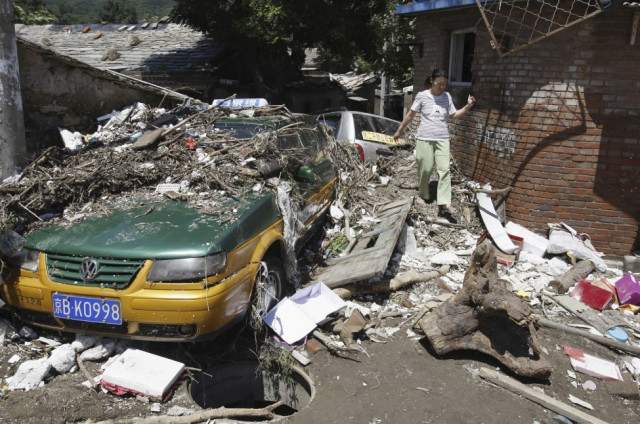Beijing floods caused significant losses: Official
Casualty numbers are still being tallied.

Authorities in Beijing have still not updated a statement issued late Sunday that said 37 people had been killed in Saturday's freak rain, the heaviest since records began more than 60 years ago, with another seven still missing.
But many residents of the city believe the true figure may be much higher, after rivers burst their banks and flooded major highways, submerging large numbers of vehicles.
In the worst-hit area of Fangshan, on the city's mountainous southwestern outskirts, distraught residents spoke of cars being swept away and said many people were still missing.
"The casualties, which is what everyone cares about, have brought about significant losses, and we are currently coming closer to tallying them up," Fangshan leader Qi Hong said in a briefing broadcast late Tuesday on state television.
Phone lines were down in some areas, making it difficult to communicate, he said. Altogether the storm is estimated to have caused losses of five billion yuan ($780 million) and destroyed 8,200 homes.
The state-run Xinhua news agency said emergency workers had pulled 84 vehicles from waters submerging a major highway between Beijing and Hong Kong. Three bodies were found, it said.
Beijing city spokeswoman Wang Hui, addressing concerns expressed on China's hugely popular microblogs, or weibos, insisted authorities would not cover up the true number of deaths and were working to identify bodies.
The city government "will make an announcement as soon as possible," Wang said at a briefing Tuesday, acknowledging that the lack of official updates had given rise to public suspicion.
She said authorities recognised the importance of disclosing casualty figures, citing the SARS (severe acute respiratory syndrome) epidemic of 2003 when China faced an international backlash for trying to cover up the disease.
Many people took to the weibos to criticise the official response to the disaster in China's rapidly modernising capital, which came at a time of heightened political sensitivity ahead of a 10-yearly handover of power.
Some said the scale of the death and destruction could have been lessened if the government had issued better warnings, including by SMS, and modernised ancient drainage systems.
On Wednesday, the city's government issued a fresh weather alert, warning of more heavy rainstorms, and sending it to residents by SMS for the first time.
Authorities have issued a "yellow alert", the third of five danger levels, warning of possible mudslides and landslides in mountainous areas such as Fangshan.
City authorities also announced that Beijing's mayor Guo Jinlong would be stepping down, sparking a flood of weibo postings - many of which have since been deleted, apparently by censors - speculating about the reasons for his departure. Many weibo users had called for his resignation.
Authorities said the move was unrelated to the floods and that Guo was stepping down to become Beijing's Communist party secretary, a more senior role.



















COMMENTS
Comments are moderated and generally will be posted if they are on-topic and not abusive.
For more information, please see our Comments FAQ